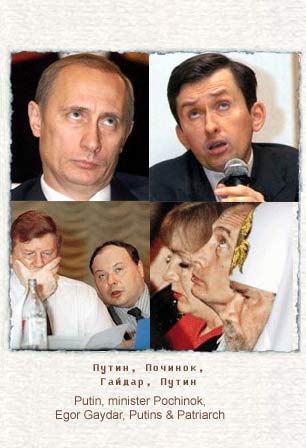|
YAKOV KROTOV
PUTIN
 *
Putin on civil society *
Putin on civil society
Putin Vladimir, prime-minister - in support
of the Moscow Patriarchy as the established church, December, 1999. His accesnsion
1.1.1999; Putin as provocator: October,
2001. Putin and the Moscow Patriarchy.
The accension of Putin to the Russian throne
Deification of Putine
I make also digest of Russian media. There is an incredible number
of people who express their attutude towards Putin using the word
"believe". "I have a faith into Putin." "Why
shall I not beieve in Putin." It is especially striking because
in Russia word "vera," "veryu" are almost identical
to the "verovat'" and "doveryayu" (trust). People
prefer to speal about faith, not about trust to Putin.
Any criticism is opposed by the suggestion: give Putin the chance,
he'd just began (actually Putin leads the government from 1999.)
Certainly, this doesn't mean that these people trust to others as
well. No, they believe only to the leader, to the "good tsar."
They will never agree "to give chance" to Yavlinsky or
Sergey Kovalyov.
Putin and death penalty
On July 11, 2001 Putin made the statement which Rissian
pro-governmental media proclaimed "sensational." During
the meeting with James Wolfenson, director of International Bank,
Putin said that he is against death penalty.
"Sensation" is that during last month many
politicians (such as Metropolitan Cyrill) called to restoration
of death penalty.
This "sensation" can be artificially planned
by Kremlin propagandists in order to improve Putin's image in the
West. What is most important: death penalty in Russia is supressed
because of Russia's membership in the Council of Europe. To lose
this membership is to lose money.
Above all, "humanism" of Putin's words (he
even mentioned God, saying that "the right to take away human
life belongs only to The Most High [Vsevyshniy]") is very cheap,
because at the same time Putin continues genocide in Chechnya. You
can thiis genocide "colonial war," the fact of mass killing
will remain. And, certainly, sudden theological exercise of Putin
sounds strange, making God a sort of executioner.
March 28, 2001, 22.30 AM, Moscow
Putin in the loo
I've enjoyed the translation of the famous (in Russia at least) Putin's words
about Chechnya made by photojournalist Jean-Francois Leroy: "[T]he tsar
Poutine spoke of "going to kick out the Chechenians, send them back into their
shit", these are his own words. Numerous photographers were there" (http://www.mairie-perpignan.fr/perpignan_old/visa/visa.asp?langue=GB).
Actually, Putin used most rude expression from the cant of gangsters
- mochit' - "to moisten", "to wet" -
as "to kill". Mochilovo - "murder." He
said that Russian troops are going to "mochit' chechentsev
v sortire," "to kill Chechens in the loo." The meaning
of the phrase was that Chechens are bad warriors, they can be caught
by surprise.
I think that now Russians are divided into three parts: those who
are delighted that their President speak such "macho"
language, those who try to forget these words in order to reconcile
with Putin, and those who are against Putin because political leader
cannot speak such jargon. Bush is famous for the slips of his tongue,
but Putin's words were not a slip, they were nicely calculated test
in order to check how far he can go. It came out that he can go
very far, too far...
Putin Not Fasting
Sergey Burlaku (KP, 21.3.2001) describes Putin's vacation in Hakassiya
and mentions that Putin ate meat. That means that Putin is not the
type of Russian Orthodox which is thought to be "normal"
nowadays in Russia.
February 23, 2001, 22.20 PM, Moscow
Tyrants measured
I was asked to explain whether elections of Putin were honest.
No, they were not -- at least two millions votes have been falsified.
Vladimir Pribylosvky states that Putin received not 52% (as officially
reported), but 48-49% (Novoye Vremya, #8, 2001). In English about
this wrote Evgeniy Borisov in The Moscow Times, 09.09.2000.
In Russian in details: Vladimir Pribylovsky himself, site "Russian
Deadline," 15, 18, 19 December 2000 (http://www.deadline.ru/articles/politics/pribyl/default.asp?).
I think that the actual size of falsification had been even larger.
In Russian province, in small national republics like Dagestan there
is no problem of writing any figures. It is very funny how Russian
"politologists" explain everything. When Yeltsin came
to power they've explained that Yeltsin is popular because he has
special Russian "spirit" ("charisma"), and even
his drinking is the part of that "spirit." People love
Yeltsin because he is just like they are. Now politologists explain
that people love Putin because he doesn't drink and embodies their
ideal of humble but resolute leader. Practically, it means that
all totalitarian leaders can be divided into two types: "big"
Mussolini, Franko, Yeltsin, Saddam -- and "small" Hitler,
Stalin, Putin, Arafat. But such taxonomy is senseless, because it
works too good. You cannot think of anyone who will be rejected
as a possible tyrant because he doesn't fit into one or another
class.
|


